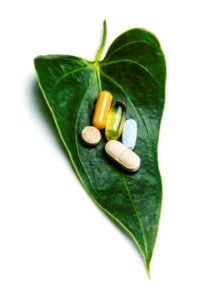
A variety of studies now suggest that certain supplements can not only improve physical health but improve mental health as well. And that raises the question: Could, perhaps, specific supplements make medications like antidepressants more effective, especially in patients who may not be getting the relief they need from the drugs? As it turns out, a new meta-analysis examining the effects of supplements on antidepressant medication efficacy suggests so.
Jerome Sarris, a senior research fellow at the University of Melbourne’s ARCADIA Mental Health Research Group in Australia, first became interested in the idea that nutritional supplementation may help antidepressant medications work better as he read up on the effects of certain supplements on the brain.
“Studies suggested that certain nutrients have effects on the brain. Omega-3’s, some B vitamins, and some amino acids have been shown to change a person’s mental state. That was intriguing,” he said. “But what had not been looked at specifically was what happens when some of these nutraceutical supplements are used in combination with an antidepressant medication. So that’s what I wanted to look at.”
Sarris and colleagues did an international review of dozens of clinical trials that examined patients who took supplements in combination with prescribed antidepressant medication. The group found that certain supplements could improve the efficacy of drugs like selective serotonin reuptake inhibitors (SSRIs), tricyclics, and serotonin-norepinephrine reuptake inhibitors (SNRIs). Some of the supplements that were linked to a potentiation, or increased efficacy, of these drugs included a specific omega-3 fatty acid called eicosapentaenoic acid (EPA), Sadenosylmethionine, a form of B-vitamin folic acid (methylfolate) and vitamin D. There was also some evidence that zinc, vitamin C, and folic acid may also help. This study backs up previous studies that suggest a lack of methylated folate is linked to depression. The GeneSight test can identify whether you have a particular genetic mutation that may prevent you from creating enough methylated folate naturally to generate the neurochemicals required to properly process antidepressant medication.
While Sarris said he and his colleagues expected an effect for the Omega-3 acid as it has already been shown to have positive effects on mood when used alone, he said he was surprised by the analysis’ overall strong clinical effect size. These supplements really did seem to help. But that said, he says this study does not in any way suggest that people diagnosed with depression should stop taking their prescribed antidepressant medication and rely on supplements alone.
“This study is looking at the combination of supplements with antidepressant medication,” he says. “And that’s where we saw that positive effect.”
And that, he argues, means that psychiatrists and other physicians who prescribe antidepressants might also think to recommend supplementation to their patients in some cases.
“A good diet is a great place to start. But supplements can help, too. For some people, if the medication is not offering enough help, there may be the possibility to combine some of these supplements to get a stronger effect from their antidepressants,” he says. “Supplementation can be a part of clinical care. Because, with the right supplements, it’s safe, it’s effective and it’s evidence-based.”
Our articles are for informational purposes only and are reviewed by our Medical Information team, which includes PharmDs, MDs, and PhDs. Do not make any changes to your current medications or dosing without consulting your healthcare provider.
The GeneSight test must be ordered by and used only in consultation with a healthcare provider who can prescribe medications. As with all genetic tests, the GeneSight test results have limitations and do not constitute medical advice. The test results are designed to be just one part of a larger, complete patient assessment, which would include proper diagnosis and consideration of your medical history, other medications you may be taking, your family history, and other factors.
If you are a healthcare provider and interested in learning more about the GeneSight test, please contact us at 855.891.9415. If you are a patient, please talk with your doctor to see if the GeneSight test may be helpful.




